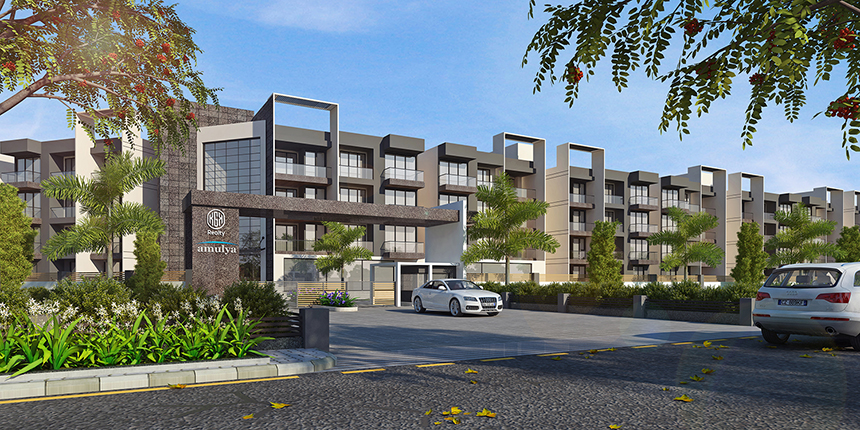

With over a century up its sleeve, KGK Realty offers clients access to its extensive network of sought-after industrial, residential and commercial properties – envisioned and brought to life by highly skilled and experienced professionals. Be it commercial, residential, industrial or hospitality, KGK Realty has grown into a leading real estate company combining path-breaking innovation, outstanding design, and superior execution.
Sanjay Kothari, Vice Chairman, KGK Group, shares with PEAKLIFE his expertise on the future of realty in the following months.


For the Indian real estate market, particularly the housing component, the year 2020 was supposed to be a year of recovery. The market has begun to stabilise after three years of economic interruptions caused by demonetisation, the introduction of GST and the real estate code RERA, as well as the NBFC crisis. However, all hopes were dashed when the COVID-19 global pandemic struck India, prompting the government to enforce a two-month nationwide lockdown to stem the spread of the fatal disease.
As the market steadily recovers, the industry must realign to face new realities and fulfil higher expectations. India is set to begin a new era of real estate development, innovation, and investment. Change may become the “new normal” in 2021 and adapting to this “new normal” would necessitate imagination, innovation, and digital transformation.
THE RISE OF MICROMARKETS
People are afraid to engage in real estate after 2020, however there are benefits to investing in real estate in 2021. Residential apartments and residences were in high demand in micromarkets. It has been highlighted that the year 2021 will be the year of the rising micro-market, which means that demand for plots and flats will continue to climb. As a result, investing in such properties will almost certainly yield a high return on investment.
With real-estate property rates increasing, Indians are eager to invest in cities that not only offer inexpensive flats and plots, but also have superior infrastructure and job possibilities. One can also invest in properties along a highway with all of the conveniences in order to make a better return in the future, not to mention a good rental income as well. In order to get the cash registers ringing in the Indian real estate market, developers are looking forward to 2021.
The factors listed below will guide the Indian real estate market in 2021:
Economic Prospects: India’s real estate business is one of the country’s largest revenue and employment providers. As a result, its importance in moulding the Indian economy cannot be overstated. The sector will prosper in the fourth quarter of 2021, owing to the fact that the pandemic’s impact will have subsided by then.
Commercial Real Estate Revival: To supply business in terms of rented office premises, India’s commercial real estate market relies on global outsourcing businesses. However, the introduction of telecommuting (Work From Home) has resulted in a decrease in demand for commercial space in India’s major cities. Although the commercial real estate sector may experience fresh footfall from July to December.
Residential Real Estate: In the first half of 2020, the global pandemic put a halt to the ever-critical residential property market. However, things are likely to improve in 2021, with developers offering low-cost housing to first-time buyers in an effort to clear unsold inventory.
Ancillary Businesses: A large variety of ancillary sectors, including glass, cement, wood, and paint, are reliant on the real estate sector. As a result of the shutdown, several industries experienced a severe decline in 2020. However, 2021 may provide much-needed relief for ancillary businesses, as the second half of the year is predicted to offer much-needed brightness to the real estate sector during epidemic times.
Housing prices rose sharply in the second half of 2020, and this trend is projected to continue in 2021. All the industry can do now is cross its fingers and hope for the best, though one thing is certain: strong fundamentals are critical for reviving housing demand. The rate of recovery might accelerate if the government lends a hand and injects enough stimulus to strengthen the industry and the economy as a whole.
The pandemic of 2020 has demonstrated to the real estate business that things can change for the better. For 2021 to be a formidable year for the real estate sector, an optimistic mindset and a forward-thinking perspective are essential. However, with the pandemic remaining a source of concern, cautious optimism is always required.
Disclaimer: The article is authored by Sanjay Kothari, Vice Chairman-KGK Group. The views and opinions expressed in this article are those of the author’s and do not represent those of PEAKLIFE.
More from our site
Recent Posts
Luxury’s Most Recent & Vibrant Launches This Season
The luxury landscape is brimming with bold innovations, striking partnerships, and immersive experiences
The luxury landscape is brimming with bold innovations, striking partnerships, and immersive experiences
The PEAKLIFE Regatta 2025
From fashion designer Varoin Marwah’s Coastal Calm SS '25 splash show to a thrilling nautical spin on the sea, it was a magical weekend in Mumbai
From fashion designer Varoin Marwah’s Coastal Calm SS '25 splash show to a thrilling nautical…
Inside Louisiana’s Biggest Festival: 10 Things You Didn’t Know About Mardi Gras
More than a party, Mardi Gras is a cultural phenomenon!
More than a party, Mardi Gras is a cultural phenomenon!
Design Your Dream Home With These Expert Tips
A home that’s stylish, cosy, and truly yours!
A home that’s stylish, cosy, and truly yours!
Luxury in Fiji: Indulge in Paradise
From private island resorts to lavish overwater bungalows, this South Pacific paradise seamlessly blends indulgence with natural beauty
From private island resorts to lavish overwater bungalows, this South Pacific paradise seamlessly blends indulgence…
A Traveller’s Quest: Soorahi
This premium blend whisky brand aims to reflect a spirit of exploration and evolution in India’s alco-beverage landscape
This premium blend whisky brand aims to reflect a spirit of exploration and evolution in…


